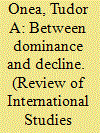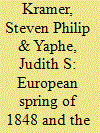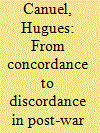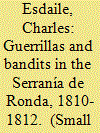| Srl | Item |
| 1 |
ID:
131700


|
|
|
|
|
| Publication |
2014.
|
| Summary/Abstract |
This article investigates the role of status considerations in the response of dominant powers to the rise of emergent states. Accordingly, the hypothesis explored is that dominant actors are prone to fear that they will lose their upper rank, and, due to this status anxiety, resist the efforts of emergent powers to match or surpass them. The article begins by explaining why political actors deem status important and puts forward a theory of status anxiety in world politics. The more pronounced is this anxiety across status dimensions (economic and military capabilities as well as prestige), the higher the likelihood of conflict. This argument is then tested against competing theories of dominant power behaviour in two cases: the relations between France and Britain from the 1740s to Napoleon and those between Britain and Germany from the 1880s to World War One.
|
|
|
|
|
|
|
|
|
|
|
|
|
|
|
|
| 2 |
ID:
137594


|
|
|
|
|
| Summary/Abstract |
The Arab Spring may be a historical turning point similar to the revolutions that swept Europe in 1848. The latter also began as a seemingly invincible wave demanding democratic reforms but turned into inglorious struggles with uncertain outcomes. They reshaped the map of Europe by replacing multinational empires with the relatively new concept of nationalism as the defining principle of governance. The Arab Spring of 2011 could do the same in the Middle East, where states are still defined according to the imperial principles laid out in World War I secret agreements. If 1848 proves anything, it is that the significance of great revolutionary upheavals emerges long after the barricades have been torn down. The year 1848 was not so much an end as a beginning; it is too early to tell how the Arab Spring will end.
|
|
|
|
|
|
|
|
|
|
|
|
|
|
|
|
| 3 |
ID:
128243


|
|
|
|
|
| Publication |
2013.
|
| Summary/Abstract |
It was a remarkable sight, on this sunny day of 26 August 1944: the patrician figure of Charles de Gaulle leading the victory parade down the Champs-Élysées following the evacuation of the French capital by the German occupier.1 The triumphal march under the acclaims of the Paris citizenry was symbolic of the dominant position the general had assumed in the Gouvernement provisoire de la République française. As provisional head of state and the dominant military figure in France, he was in a position of unprecedented power for a French army officer, at least since Napoleon Bonaparte had proclaimed himself First Consul in 1799. De Gaulle indeed held near-dictatorial powers as he set about rebuilding France at home and restoring control over her colonial empire. Nevertheless, he would resign less than two years later when faced with fierce opposition by established political figures disagreeing with his proposed constitution for a new republic.
Thus created in 1946 through the peaceful transfer of power from a quasi military supremo to a legitimately elected government, only to come to an ignominious end in 1958 under the threat of a military coup during the darkest days of the Algerian War of Independence, the short-lived French Fourth Republic experienced the full spectrum of civil-military relations (CMR). This episode provides a dramatic test case to measure the validity of any given CMR theory as it encompassed such a wide range of well-documented events focused on the very essence of the problematic, explaining civil society's relationship with the military organization established to protect it.2 One such theory seeks to measure a fundamental element of that equation, trying to answer the challenging question of '[w]hy will a military intervene in its own nation's system of government' by outlining the 'conditions [that] promote or inhibit domestic military intervention'.3 Scholar Rebecca Schiff proposed such a model nearly two decades ago, seeking to alleviate the alleged shortcomings of more established theories largely derived from the experience of the United States and often limited to arguments concerned with the separation of civil and military institutions.4
She posited instead that her theory of concordance 'considers the unique historical and cultural experiences of nations' and 'moves beyond institutional analysis by addressing issues relevant to a nation's culture'.5 This paper seeks to measure the validity of such a premise through the study of civil-military relations under the French Fourth Republic. This approach will require the reader initially to understand the evolution of CMR in France through the trauma of military defeat in 1940 and the rise of de Gaulle as well as the circumstances that led to the instauration of the Fourth Republic. It will then become necessary to evaluate the influence of successive challenges overseas, first in Indochina and then in Algeria, to establish the legitimacy of the concordance theory as civil-military relations came to a nadir in France. First, though, one must clearly comprehend the foundations of Schiff's theory in order to adequately judge its validity through the proposed case study.
|
|
|
|
|
|
|
|
|
|
|
|
|
|
|
|
| 4 |
ID:
133515


|
|
|
|
|
| Publication |
2014.
|
| Summary/Abstract |
The Spanish Guerrilla (1808-1812) which has given its name to ideologically motivated insurgencies is usually portrayed as a patriotic uprising against the French occupation forces of Napoleon. It was that, in part, but also many other things besides. This case study illustrates its overlap and convergence with banditry but also with social unrest turned into uprisings directed by poor Spaniards against their creditors, as in the storming of Ronda by insurgents in 1810. From the propaganda of the day to the subsequent Spanish patriotic historiography, there has been a tendency to exaggerate the amplitude of events and also the damage that was done to the French forces and the casualty figures inflicted on them.
|
|
|
|
|
|
|
|
|
|
|
|
|
|
|
|